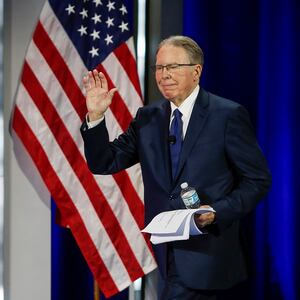Pay Dirt is a weekly foray into the pigpen of political funding. Subscribe here to get it in your inbox every Thursday.
Few political groups in U.S. history have seen a collapse as swift and dramatic as the National Rifle Association.
Over the last several years, the NRA has experienced a public implosion, as the group loses members and revenue amid serious accusations of mismanagement and corruption. And according to the latest NRA tax returns obtained by The Daily Beast, the reputational and organizational damage is rolling on with seemingly no end in sight.
While the events contributing to the NRA’s freefall have been well-documented, a review of the gun rights group’s tax filings and political spending over the last 15 years provides some of the clearest evidence of its downfall—showing just how badly the legal setbacks and mismanagement have ravaged the once-formidable gun lobbying giant.
The NRA’s most recent tax return, filed in November of this year for 2022, reveals dramatic declines along almost every conceivable metric: revenue, assets, member dues, lobbying, and political spending—with conversely sharp increases in legal costs and deficits.
And as the NRA’s power and influence has waned, gun violence has perversely soared, particularly suicides, especially in the wake of the pandemic.
In one view, the NRA’s decline might be seen as a consequence of its own “success,” as its gargantuan lobbying efforts in the early to mid-2010s effectively froze the national gun control debate, diminishing the advocacy group’s utility. Still, that might be changing.
In 2022, 15 GOP senators repudiated the NRA, passing the first meaningful gun control package in decades. That could be a signal of the NRA’s demise, but it also could be interpreted as a reaction to the surging gun violence that continues to this day in part because of the lax gun laws that the NRA advocated for and won over that time.
What is clear is that the NRA today is in a dismal state. On the income side, 2022 was the fourth year in a row that revenue fell, marking its weakest fundraising year since at least 2008. Membership dues are at all-time lows, according to available public data, and staffing is at the lowest point since those costs began their downward plunge in 2016, while the group’s legal costs—largely driven by civil actions alleging rampant mismanagement of funds and self-dealing—are proportionately higher than ever.
The roughly $211 million that the NRA reported in income last year is still, of course, an enormous figure—more than double that of its handful of gun-rights competitors combined. But it’s also less than 60 percent of the NRA’s 2016 revenue high of $367 million.
That decline has driven the NRA deep into the red, leading to a $22 million deficit last year. That’s the group’s largest deficit since 2016, when it spent record sums during a vital election cycle, leaning on its high revenues and fat cash reserves as ballast for the spending binge. Today, however, the well is drying up.
The NRA’s net assets have plummeted. An internal audit obtained by watchdog group Citizens for Responsibility and Ethics in Washington shows that the group shed $36 million in value during 2022, going from $77.8 million in January to $41.8 million by year’s end.
And as a result, the NRA has been forced to tighten its belt while its influence wanes.
The group reported nearly $230 million in expenses last year, its second-lowest overall spending level since 2011, according to archived tax records. Only 2021 was lower.

Wayne LaPierre, executive vice president and CEO of the National Rifle Association (NRA) speaks at the NRA annual meeting in Indianapolis, Indiana.
Lucas Jackson/ReutersOne significant metric of decline is the group’s outside political spending, which has flagged since Donald Trump was elected. Total political outlays for the 2018, 2020, and 2022 cycles combined are at parity with what the NRA spent in the 2016 election alone, according to data compiled by the Center for Responsive Politics.
In the lobbying realm, the NRA shelled out big in 2021. That came directly on the heels of New York Attorney General Letitia James’ ongoing civil fraud suit, filed in August 2020, and while the organization was simultaneously attempting to declare bankruptcy and reorganize in Texas. (Texas courts ultimately rejected that reorganization as a bad-faith effort.)
But in the two years prior to 2021, lobbying expenditures had fallen dramatically, as they did again in 2022. The levels for the current year, 2023, are stacking up to potentially be the lowest since 2008, according to CRP data.
A number of factors have put downward pressure on the NRA’s finances.
One major contributor is the drop in dues, with member fees bringing in around $83 million in 2022—the lowest on record since at least 2008 and a nearly 59 percent drop from 2016, adjusted for inflation, according to an analysis this October from CREW. The NRA also saw its lowest income from contributions and grants income since 2011, despite an overall 35 percent increase in fundraising expenses—indicating that the group’s investments are yielding smaller returns.
With less money coming in, the nonprofit has been running up staggering legal fees from its ongoing civil disputes. Those include its court fights in New York, which involve millions of dollars in alleged self-dealing and mismanagement—including on behalf of the organization’s beleaguered CEO, Wayne LaPierre—as well as a battery of complaints filed with the Federal Election Commission alleging unlawful political coordination and shell company shenanigans.
The NRA has fought the New York lawsuit tooth and nail. The group went on the offensive with its own separate lawsuit against the state, which made its way to the Supreme Court this November. Last year, those efforts yielded a small victory when a New York court stopped that state’s AG, James, from dissolving the organization entirely, though she was allowed to pursue narrower damages and is actively doing so.
As a result, the NRA’s legal costs in 2022 were proportionately the highest they’ve ever been, with its $44 million in legal payments accounting for nearly 20 percent of expenses—roughly one of every five dollars spent. (In 2017, the NRA’s legal costs were 2 percent of expenses.) The group’s largest single vendor last year was its principal law firm, Brewer Attorneys and Counselors, which received about $23.5 million, or nearly 10 percent of the NRA’s 2022 budget.
In response to The Daily Beast’s comment request, NRA spokesperson Billy McLaughlin provided a statement arguing that the group’s legal defense costs are an investment, noting that the NRA is still head and shoulders above competing gun rights groups.
“As pundits and anti-Second Amendment crusaders continue to predict the demise of the NRA, the Association remains the largest and most effective advocacy organization of its kind, period. The NRA has invested heavily in its legal defense against the NYAG and, in March 2022, scored a major legal victory—when a New York court struck down attempts by the NYAG to dissolve the organization,” McLaughlin said.
“Beyond that, the NRA continues to score many legal and legislative victories, defending the Second Amendment and its patriotic members,” he continued. “As another example, the U.S. Supreme Court recently accepted the NRA’s First Amendment case against a former New York State financial regulator for review. That decision is a landmark development in one of the most closely watched First Amendment cases in the nation. Only a few weeks ago, it was announced that the ACLU will join as counsel in that case.”
(The ACLU denounced the NRA in a statement to The New York Times explaining why it took the case, saying the civil liberties group doesn’t support the NRA or its mission. “We signed on as co-counsel because public officials shouldn’t be allowed to abuse the powers of the office to blacklist an organization just because they oppose an organization’s political views,” the ACLU said.)
Robert Maguire, a nonprofit analyst at CREW, told The Daily Beast that he hasn’t seen anything like the downfall the NRA has experienced.
“The NRA is the definition of an embattled organization,” Maguire said, referencing the array of legal and internal woes plaguing the organization. “2016 wasn’t that long ago, and at that time the NRA was, if not the most powerful organization in D.C., certainly one of them.”
“We have a lot of mass shootings in this country, and we used to have this discussion, this wait-and-see what the NRA is going to say,” Maguire continued. “But you don’t see them playing on the national stage the way they used to, and its repugnant statements after mass shootings are pretty much expected and just seem like an absurd afterthought.”
Maguire noted that “as an alternative or corollary to their implosion, they are a victim of their own success.”
The NRA eschewed its gun safety philosophy in the 1970s, transitioning into a trade organization to promote gun sales under the banner of the Second Amendment. That general shift—which former Chief Justice Warren Burger famously described as the “one of the greatest pieces of fraud, I repeat the word ‘fraud,’ on the American public”—was partly designed for profit, partly for electoral politics, and partly to normalize firearms ownership and thereby forestall legislative and judicial restrictions.
Those efforts have rendered gun control politically nonviable for years, even in the face of overwhelming popular support. And as political and judicial attitudes grew increasingly calcified, the NRA has become less necessary.
A few gun rights groups have tried to give the NRA a run for its money, but so far they haven’t gotten the same traction. A review of tax returns from the leading organizations—the National Shooting Sports Foundation, the Safari Club, and Gun Owners of America—reveals mixed trends in revenue. But in 2022, all three groups combined only pulled in about one-third of the NRA’s income.
Maguire noted that the NRA’s downfall tracks with increased gun ownership.
“Previously, we didn’t have this broad gun idolization culture, but in the ’90s you have Columbine, followed by mass shooting after mass shooting, and the NRA comes out every time to say, ‘You’re not going to take our guns away from me,’” Maguire said. “And every time, gun sales go up, so that today we have more guns than people in this country. We’re so saturated with them, who needs an organization to protect our guns?”
But gun deaths have also increased along with ownership, a darkly ironic trendline when contrasted with the gun lobby’s decline.
Firearms deaths peaked in 2021, with the Centers for Disease Control and Prevention recording nearly 49,000 fatalities—the majority of them suicides, which was a record high—and only a decrease of 700 deaths in 2022. Unofficial data for 2023 from the Gun Violence Archive, which compiles information from law enforcement and government sources, shows 41,585 firearm-related deaths as of Dec. 20, with more than 56 percent being suicides. There’s also been a steady rise in mass shootings, which the FBI defines as involving four or more people—with Pew Research data revealing a long-running and increasingly dramatic rise in “active shooter” incidents.
However, 2022 also saw President Joe Biden signing the first meaningful federal gun control legislation in three decades, which passed the Senate with significant bipartisan support. As holes appear in the firearms lobby, gun control advocacy organizations like Everytown and Giffords are gaining traction.








